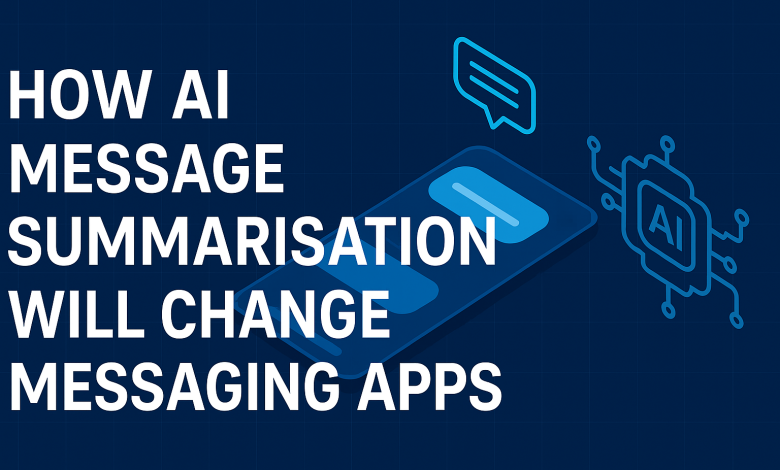
The evolution of messaging has been rapid, moving from simple text exchanges to media-rich, personalized conversations. Now, artificial intelligence (AI) is adding another layer of innovation, AI-powered message summarisation. This feature, currently in testing by major communication platforms, aims to save users time by automatically summarising long conversations or unread chats. For users of popular modified apps like GB WhatsApp Pro, the potential impact of AI message summarisation could redefine how they manage daily communication.
What Is AI Message Summarisation?
AI message summarisation uses natural language processing (NLP) to condense lengthy conversations into short, meaningful summaries.
Instead of scrolling through dozens of unread messages, AI can highlight the key points, who said what, decisions made, and what requires your response.
It’s similar to what Gmail already does with “Smart Summaries” or how AI writing tools can condense large text blocks into a few lines.
In WhatsApp’s context, this feature would mean users returning after a long break can instantly grasp what they missed, group discussions, family updates, or business messages, without reading every line.
Why AI Summaries Are a Big Deal for Messaging Apps
The average person receives hundreds of messages every day. Group chats, community threads, and business updates can become overwhelming.
AI-driven summaries help tackle the information overload problem by offering context-aware insights rather than just keywords.
Here’s how this trend is transforming messaging:
- Contextual understanding: AI can identify who’s speaking, what the tone is, and the topic of discussion.
- Action recognition: It can highlight if a task or reminder was discussed, helping users respond faster.
- User prioritisation: Summaries can highlight messages from certain contacts marked as “important.”
- Privacy-aware processing: Modern models summarise locally on-device, reducing risks of data sharing.
For power users, this isn’t just convenience, it’s efficiency. AI is becoming a digital assistant that filters noise and lets you focus on what matters.
How It May Impact GB WhatsApp Users
Modified apps like GB WhatsApp have long been known for introducing features earlier than the official versions, from custom themes to enhanced privacy controls. The arrival of AI-powered tools, especially message summarisation, will likely influence how developers of such versions integrate similar or extended functionality.
Potential benefits for GB WhatsApp users include:
- Smarter chat management: Imagine entering a 200-message group and seeing a three-line summary instead of endless scrolling.
- Customised AI models: GB WhatsApp could allow users to fine-tune how summaries are generated, choosing short highlights or detailed overviews.
- Offline AI processing: Because GB WhatsApp often supports device-side customisation, local AI models could summarise messages without cloud dependency.
- Enhanced productivity: Students, entrepreneurs, and remote workers could manage their time more effectively by reviewing summaries first.
These possibilities make GB WhatsApp not just a modded app, but potentially an early adopter of personal AI assistants for chat management.
Challenges and Privacy Considerations
Despite the excitement, AI summarisation raises valid concerns. Messaging is a deeply personal activity, and even local AI features need strong security to prevent misuse.
The main challenges include:
- Data sensitivity: AI models must process content responsibly, especially in private or encrypted chats.
- Accuracy: AI might misinterpret sarcasm, slang, or emotional tone.
- Transparency: Users need control, when and how summaries are generated, and whether they’re stored or deleted.
- Device compatibility: Older Android devices may struggle to handle on-device summarisation efficiently.
Addressing these issues will be crucial if WhatsApp or modded platforms want users to trust AI-driven summarisation fully.
The AI Ecosystem Behind Summarisation
Under the hood, summarisation relies on transformer-based NLP models, the same technology that powers large-language models like ChatGPT and Gemini.
When scaled down for phones, these models can quickly process recent chat history to generate bullet-style takeaways.
Recent developments in on-device AI chips (like Google’s Gemini Nano or Qualcomm’s AI Engine) make this increasingly practical for messaging platforms.
These systems don’t just “read and rewrite”, they infer meaning, detect tone, and can even highlight to-do items.
Soon, messaging apps might integrate built-in AI dashboards where users can ask:
“What’s the summary of my unread chats from last night?”
and get a single coherent update across multiple groups.
Connecting AI, Productivity, and User Control
AI summarisation in messaging is part of a larger shift toward contextual productivity, technology adapting to the user, not the other way around.
Apps like GB WhatsApp Pro already emphasize personalization and control. When AI joins that mix, users could see smarter automation, from summarised chats to predictive replies or smart scheduling.
Platforms such as AI Journ frequently explore how AI is reshaping daily digital habits, helping readers understand both the potential and the ethical limits of these technologies.
As AI blends into everyday messaging, the line between productivity tools and communication apps will continue to blur.
Conclusion: The Future of Chat Efficiency
AI message summarisation is not a distant dream, it’s an emerging reality that could make messaging more human, not less.
Instead of drowning in notifications, users will soon get curated, meaningful summaries of their conversations.
For those who prefer flexibility and customization, apps like GB WhatsApp could offer even more innovative ways to integrate AI safely and effectively.
The future of messaging is smarter, faster, and deeply personal.
As AI continues to evolve, it won’t just help us chat, it will help us understand our conversations better.




